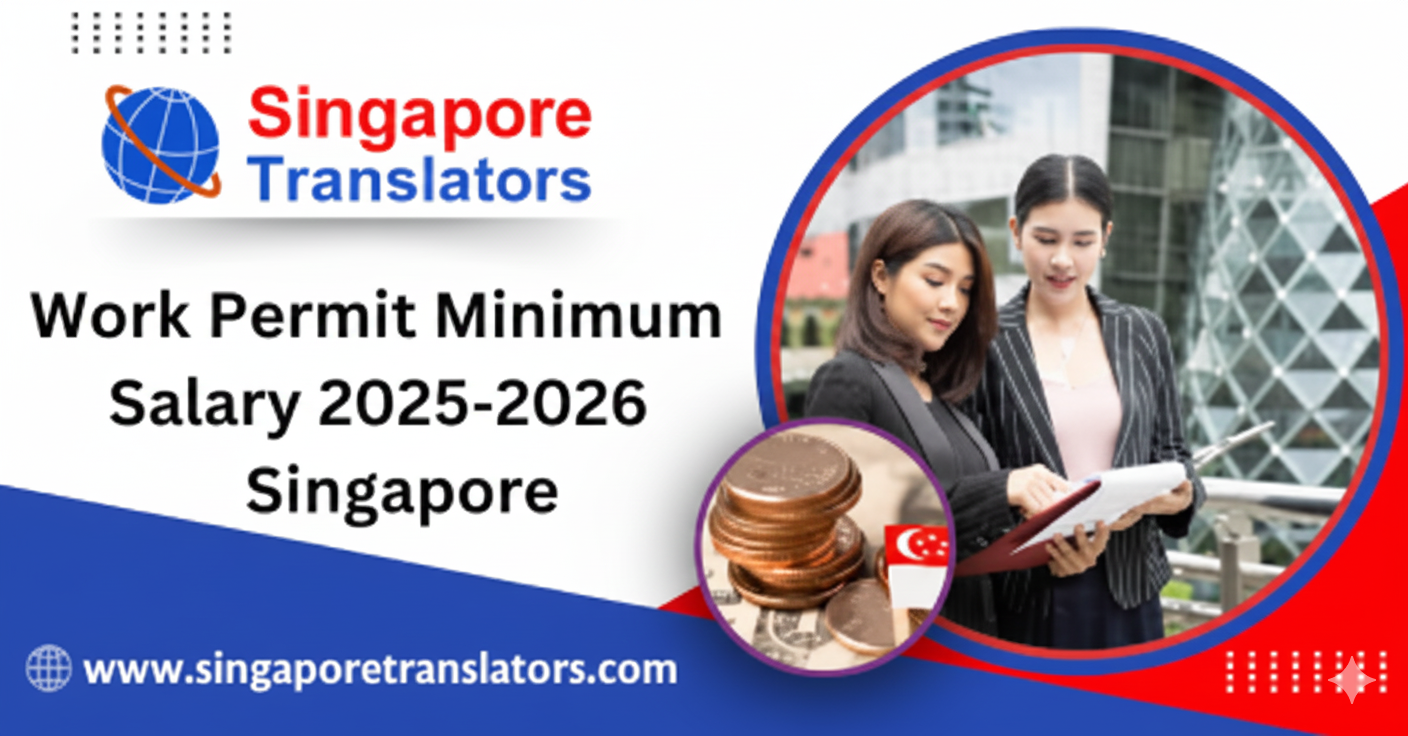Foreign workers who want to work in Singapore must follow the rules set by the Ministry of Manpower (MOM). These rules help keep jobs safe, fair, and well-organised. In 2025, Singapore introduced new salary rules, new pass rules, and new checks for employers.
In this guide, we explain all important things about working in Singapore in 2025. You will learn about work pass types, minimum salary, COMPASS score, levy, quota, stay limit, renewal rules, source countries, housing rules, safety rules, how these rules affect workers and employers, and why document translation is important.

What is a Work Permit?
A work pass is a legal paper that allows a foreign worker to work in Singapore. Without a work pass, a foreign worker cannot work. MOM checks:
- Salary
- Skills
- Job type
- Education
- Safety rules
- Employer background
Every pass has different rules. The three main passes are:
- Employment Pass (EP) – For highly skilled workers, executives, managers, and professionals.
- S Pass – For mid-level skilled workers.
- Work Permit (WP) – For lower-skilled workers in areas like construction, ships, factories, cleaning, and services.
Each pass has rules for salary, age, quota, renewals, and more.
Get Fast & Accurate official notarization for ICA, MOM, MFA.
Types of Work Passes in Singapore
In Singapore, there are three main types of work passes:-
2.1 Employment Pass (EP)
- For high-skill workers
- For professionals, managers, executives
- Needs strong qualifications
- Needs higher salary
- Must pass COMPASS points
Examples of EP holders:
Engineers, IT experts, managers, business specialists, researchers.
2.2 S Pass
- For mid-skill workers
- Needs diploma or similar skills
- Needs fixed salary
- Needs experience
- Limited quota per company
Examples of S Pass holders:
Technicians, supervisors, designers, cooks, specialists.
2.3 Work Permit (WP)
- For low-skill workers
- For construction, shipyard, manufacturing, marine, cleaning, services
- No need for high education
- Salary is generally lower
- Very strict safety and housing rules
- Strict source country rules
Examples of WP workers:
Construction helpers, machine operators, cleaners, shipyard workers.
Hire a Language translator for converting your legal & Other Documents.
2025 Updates for Work Permit Minimum Salary Singapore
As of 2025, the Ministry of Manpower (MOM) has updated the Singapore work permit salary requirements for work pass holders.
3.1 Employment Pass (EP) Minimum Salary 2025
For New EP Applications (from 1 Jan 2025)
- All sectors except finance: SGD 5,600/month
- Finance sector: SGD 6,200/month
Salary increases with age
- Age 23: minimum salary
- Age 45+: up to SGD 10,700 (normal)
- Age 45+: up to SGD 11,800 (finance)
For Renewals (2025)
- All sectors: SGD 5,000/month
- Finance: SGD 5,500/month
- EP also uses the COMPASS point system.
3.2 S Pass Minimum Salary 2025
For New S Pass Applications (from 1 Sep 2025)
- All sectors: SGD 3,300/month
- Finance sector: SGD 3,800/month
Salary increases with age
- Age 23: minimum
- Age 45+: up to SGD 5,650
3.3 Work Permit (WP) Salary 2025
Work Permit has no fixed minimum salary increase in 2025. But employers must follow limits for:
- Working hours
- Housing
- Meal allowances
- Overtime rules
- Transport rules
Salary depends on sector, nationality, and experience.
EP vs S Pass vs Work Permit Salary: Full 2025 Comparison
This section gives you a clear and easy comparison of all three work passes in Singapore for 2025. It shows the salary rules, worker type, quotas, levies, and key requirements so you can understand the differences quickly.
| Feature | Employment Pass (EP) 2025 | S Pass 2025 | Work Permit (WP) 2025 |
|---|---|---|---|
| Worker Type | High-skilled professional | Mid-skilled worker | Lower-skilled worker |
| Minimum Salary | SGD 5,600 (new applications) / SGD 5,000 (renewals) | SGD 3,300 (all sectors) / SGD 3,800 (financial services) | No change; same as 2024 |
| Age-Based Salary | Yes (up to SGD 10,700–11,800) | Yes (up to SGD 5,650) | Not needed |
| Education | Degree / strong skills | Diploma / skills | No high education needed |
| Quota | No quota | Yes | Yes |
| Levy | No levy | Yes | Yes |
| Stay Limit | Up to 3 years | Up to 3 years | 2 years (sector-based) |
| Processing Time | Faster | Medium | Slowest |
| Renewal Rules | COMPASS scoring | Salary + quota + levy | Sector quota + levy + age limit |
| Best For | Professionals, managers | Technicians, specialists | Construction, factory, service workers |
Salary Comparison (2022–2025) for EP, S Pass & Work Permit
This table shows how Singapore’s minimum salary rules changed over the years from 2022 to 2025.
Employment Pass (EP) Salary Changes (2022–2025)
| Year | General Sector Minimum Salary | Financial Sector Minimum Salary |
|---|---|---|
| 2022 | SGD 4,500 | SGD 5,000 |
| 2023 | SGD 3,600 | SGD 4,500 |
| 2024 | SGD 3,500 | SGD 4,500 |
| 2025 | SGD 5,600 (new applications) / SGD 5,000 (renewals) | SGD 6,200 (new applications) / SGD 5,500 (renewals) |
Analysis: The EP salary increased a lot in 2025. It is much higher than in 2022, 2023, and 2024. The new rule also brings age-based salary. This means older workers must be paid more. The jump in 2025 shows Singapore wants only skilled and high-earning workers for EP jobs.
S Pass Salary Changes (2022–2025)
| Year | General Sectors | Financial Services |
|---|---|---|
| 2022 | SGD 2,500 | Not stated |
| 2023 | SGD 2,500 | Not stated |
| 2024 | SGD 2,500 | Not stated |
| 2025 | SGD 3,300 | SGD 3,800 |
Analysis: S Pass salary stayed the same from 2022 to 2024. But in 2025, the salary increased a lot. This shows Singapore wants better-skilled mid-level workers. Also, the financial sector now has its own salary rule, which means stricter control for that industry.
Work Permit Salary Changes (2022–2025)
| Year | Manufacturing | Construction |
|---|---|---|
| 2022 | SGD 1,500 | SGD 1,800 |
| 2023 | SGD 1,500 | SGD 1,800 |
| 2024 | SGD 1,500 | SGD 1,800 |
| 2025 | SGD 1,500 | SGD 1,800 |
Analysis:
There is no change in Work Permit salary from 2022 to 2025. It stayed the same for all four years. This shows the government wants to keep costs low for jobs that need lower skills, especially in construction and manufacturing.
No 1 Online Translation Services for Document & Legal Translations in Singapore.
How the Work Permit 2025 Minimum Salary Rules Will Affect Employers
Here we explains how the new 2025 Work Permit salary rules will change the workload, costs, and planning for employers. It shows how higher salaries, new budgeting needs, and updated hiring rules will impact companies in Singapore.
1. Higher Salary Costs for Employers
Employers must pay workers more because of the new salary rules.
- This means monthly expenses will increase.
- Companies that hire many workers will feel the change more.
- Some businesses may need to reduce other costs to manage this.
2. Need to Update Company Budgets
Businesses will need to change their salary budget.
- Money must be moved from other areas to cover higher pay.
- Employers must plan ahead to avoid problems in the future.
- Proper budgeting helps avoid sudden financial pressure.
3. Hiring Will Become More Difficult
Because salaries are now higher, some employers may:
- Struggle to find workers within their budget.
- Need to offer better pay to attract skilled workers.
- Take more time to decide which workers they can afford.
4. Need to Review Existing Employee Salaries
Employers must check if current staff meet the new salary rules.
- If not, salaries must be increased.
- This helps workers stay and reduces the risk of losing them.
- Renewal issues can be avoided when salaries match MOM rules.
5. Changes in Long-Term Business Planning
The new salary rules affect long-term plans.
- Companies may adjust their hiring strategy.
- Some businesses may move to more automation to reduce manpower needs.
- Prices of products or services may increase to balance higher costs.
6. Bigger Impact on Small Businesses
Small businesses will feel the changes more strongly.
- They usually have low budgets and fewer resources.
- Meeting higher salary rules can be difficult.
- They may need extra support or better planning to manage costs.
7. Need to Follow MOM Rules More Carefully
Employers must make sure they follow all new MOM guidelines.
- Wrong salary or missing documents can lead to delays.
- Companies must update HR records properly.
- Following rules keeps the work permit process smooth.
Get Fast & Accurate official notarization for ICA, MOM, MFA.
Get MoM Documents Professionally Translated by Certified Singapore Translators
We hope this article has answered all your questions about the latest salary requirements for work permits in Singapore for 2025. If you’re planning to work for a company in Singapore, use this information to prepare well and avoid any issues with your application.
If you need to get your Ministry of Manpower (MoM) documents professionally translated, turn to SingaporeTranslators.com for expert help. Our certified translation services in Singapore ensure that your documents are translated accurately and meet all official requirements.
Whether you need document translation services for work permits, employment passes, or any other MoM-related paperwork, we’ve got you covered.
Our ICA document translation service is also available to support your PR application with precise and reliable translations. We specialize in offering PR application document translation service in Singapore, making sure your translations are clear, correct, and accepted by the authorities.
Choose our services for hassle-free, accurate translations that help you move forward with your applications smoothly.


